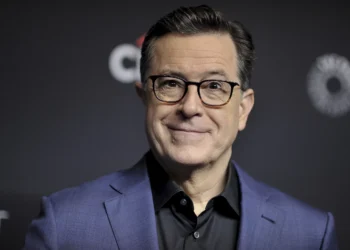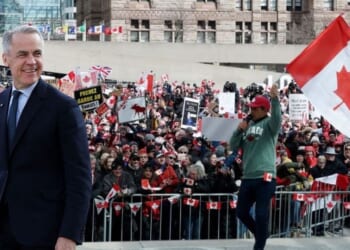The 2026 FIFA World Cup is less than a year away, but it’s already turning into a tale of two tournaments with politics and immigration policy leading a laundry list of concerns that need to be addressed before kickoff.
The last time the United States hosted the World Cup was in 1994. More than 3.5 million fans travelled to the U.S. to watch, leading to a spike in domestic interest and the launch of Major League Soccer two years later. While the sport still lags behind football, basketball, and baseball in the U.S., its popularity has grown.
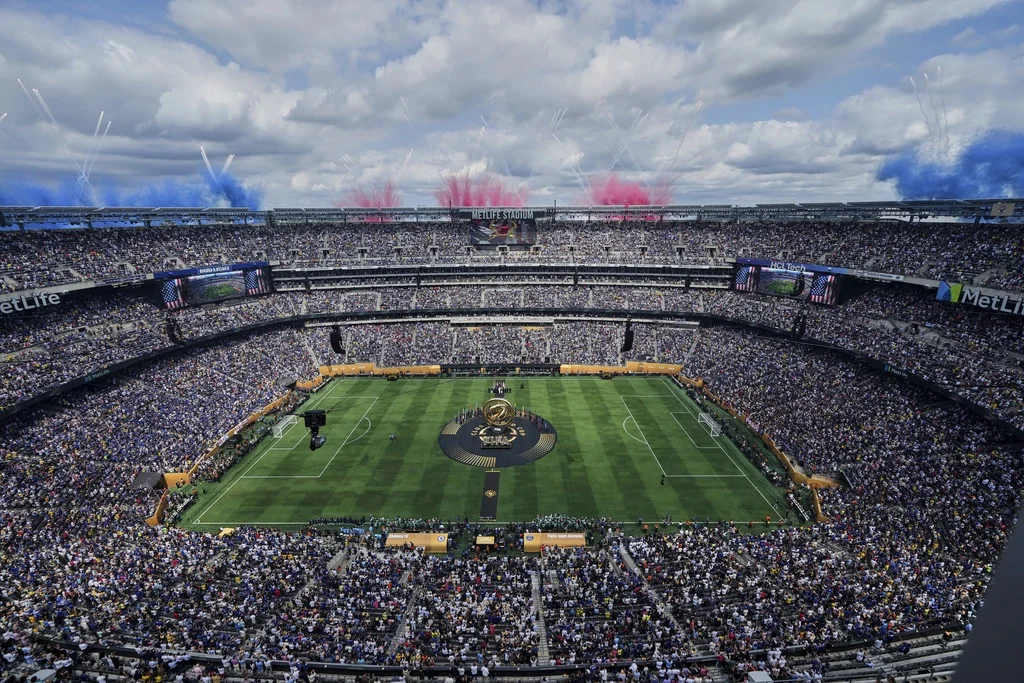
For the first time ever, three nations, the U.S., Mexico, and Canada, will co-host the world’s largest sporting event. Next year’s tournament is expected to draw 6.5 million people.
Matches are scheduled in 11 U.S. cities, with the final match at MetLife Stadium in New Jersey on July 19.
The tournament is projected to generate $17.2 billion in U.S. GDP and $40.9 billion globally, according to FIFA’s Socioeconomic Impact Analysis report released in April. But those figures could be derailed by tedious bureaucratic barriers, visa problems, and intimidating enforcement protocols that could keep thousands of international visitors away. Factor in transportation and infrastructure challenges, logistical complexities of securing both stadiums and surrounding communities, as well as field conditions and the global event could turn into a logistical and political nightmare.
‘Strained diplomatic ties’ could create tension at tournament
“Politically, the situation is complicated by the United States’s increasingly fraught relationships with Canada and Mexico, the tournament’s co-hosts,” Irina Tsukerman, a geopolitical analyst and president of Scarab Rising, told the Washington Examiner. “President [Donald] Trump’s trade policies, particularly tariffs imposed on both neighbors, have strained diplomatic ties and injected tension into what should ideally be a cooperative partnership.”
She added that the World Cup requires “seamless collaboration” across borders for logistics, security, and visitor management.
“There is growing concern that unresolved trade disputes and political friction could interfere with this cooperation and complicate the smooth execution of the event,” Tsukerman said. “The World Cup, a globally celebrated occasion, risks becoming entangled in broader geopolitical and economic conflicts between the three host nations.”
Comments from Vice President JD Vance during a recent White House event about cracking down on fans who overstay their visas added fuel to the fire.
Visa warning
While Vance insisted “everyone is welcome,” he added, “We want them to come, we want them to celebrate, we want them to watch the games. But when the time is up, we want them to go home; otherwise, they will have to talk to [Department of Homeland] Secretary Kristi Noem.”
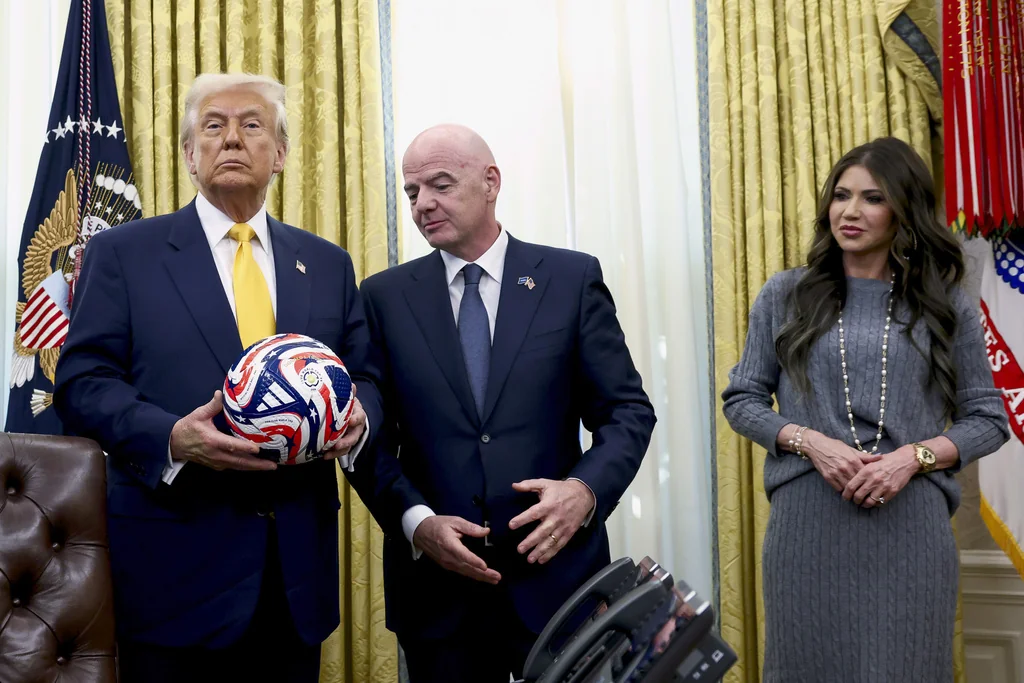
Transportation Secretary Sean Duffy also warned visitors not to “overstay your visas.”
Tsukerman said Duffy and Vance’s comments “signal a potentially more aggressive immigration enforcement posture during the World Cup, heightening anxiety among international visitors.”
“Such rhetoric threatens to alienate fans who are vital to the tournament’s atmosphere and global appeal,” she said. “It also contrasts sharply with the inclusive spirit that major sporting events typically aim to foster. This hardline stance risks casting a shadow over the U.S. as a host, creating an image of exclusion at a time when the country should be welcoming the world.”
Loren Locke, an immigration attorney and former Department of State consular officer, has been monitoring the complex intersection of major international sporting events and U.S. immigration policy, particularly the economic and reputational risks these challenges pose for the World Cup.
Visa wait times
Lock explained that Russia and Qatar, the hosts of the 2018 and 2022 tournaments, created special visas and admission procedures to help streamline the process for fans from other countries entering.
“The United States has announced no such accommodation,” she told the Washington Examiner. “Instead, international visitors who don’t qualify for ESTA [Electronic System for Travel Authorization] visa waiver travel need to secure visas through our standard process. Unfortunately, the wait time for a B1/B2 visitor visa interview is hundreds of days long at some U.S. Consulates and Embassies. It’s really important that would-be World Cup attendees from abroad make sure they have their travel authorization in place before investing heavily in their travel plans.”
She added that U.S. visa policies, as they currently stand, leave “billions on the table” if fans from key soccer markets such as Mexico, Colombia, and Brazil can’t readily obtain visas to attend.
“Since our visa system has a one to two year backlog at some consulates, our government is essentially telling foreign soccer fans they’re not welcome,” she said.
Reports of Immigration and Customs Enforcement agents at some of the 2025 FIFA Club World Cup games in June could also be a preview of what’s to come next year.
Miami-Dade County Mayor Daniella Cava issued a statement saying the presence of a federal immigration agent at a party celebrating the tournament was “deeply troubling.” The opening game of the FIFA Club World Cup took place in Miami while millions of people across the U.S. took to the streets for “No Kings Day” protests. Those images were juxtaposed against a military parade attended by Trump in Washington, D.C.
Adding to the anxiety was a social media post by Customs and Border Protection that said, “CBP will be suited and booted, ready to provide security for the first round of games.”
The post was later deleted.
Having federal immigration agents at or near the soccer events “creates a chilling effect not only on immigrants who are out of status, but also on legal immigrants, foreign visitors, and people who are afraid of being racially profiled or getting caught up in law enforcement activity,” Locke said.
Securing stadiums and nearby communities
While critics say the U.S. is treating foreign soccer fans more like security threats than valuable tourists ready to pump billions of dollars into the economy, the complexities of protecting stadiums and the surrounding communities are also problematic.
“Securing major events like the FIFA World Cup requires thousands of security professionals working in coordination with venue management, law enforcement, and community partners, with planning beginning months in advance,” Ty Richmond, president of event services at Allied Universal, told the Washington Examiner. “The security perimeter extends far beyond the stadium itself — surrounding businesses and communities become part of the larger security ecosystem through established communication chains and mutual support systems. Success depends on comprehensive risk assessments, detailed logistics planning for crowd and traffic management, and rehearsed emergency response protocols.”
Allied Universal recently provided security services for the FIFA World Cup Playoff Games and continues to play a critical role at major events such as the Super Bowl, national championships, and large music festivals.
Richmond said the most important takeaways from the past are having experienced people at the helm and being prepared for every scenario.
“The most critical lessons learned from past events of this level are that planning, preparation, and coordination mean everything to the desired objective — high-profile events require sending advanced teams to assess venues, understand potential threats, and establish clear protocols for every scenario,” he said. “We’ve also learned that while comprehensive planning is essential, teams must remain flexible and prepared for unexpected disruptions, with clear emergency triggers and chains of command that allow for rapid adaptation while maintaining security integrity.”
The 11 U.S. cities tapped to host the games are no strangers to securing large-scale professional sporting events, but the World Cup is on another level, experts told the Washington Examiner.
Transportation headaches
There are also transportation concerns.
The U.S. air travel system is inadequately equipped for the millions of visitors expected for the 2026 FIFA World Cup and the 2028 Summer Olympics in Los Angeles, according to a February report released by the U.S. Travel Association. The report points to aging infrastructure and outdated security technology as some of the main obstacles.
Fred Ferguson, president and CEO of the American Bus Association, told the Washington Examiner that current travel systems are “ill-equipped to handle the impending surge.”
“Without immediate attention, the U.S. risks overwhelming our transportation networks and tarnishing our global reputation,” he said.
‘Trumpification’ of tournament
Beyond logistics, some soccer fans and observers are worried about the “Trumpification” of the event.
This summer, the Club World Cup was largely seen as a dry run for next year’s tournament. Both the final of that tournament and next year’s soccer showpiece will take place at MetLife Stadium in New Jersey.
Trump took center stage at the trophy presentation alongside FIFA President Gianni Infantino. The men, who have a cozy relationship, were supposed to hand the gold sphere trophy to Chelsea, a London-based team that won. What happened next was awkward, at best.
Normally, dignitaries presenting the winning team with the trophy shuffle off stage to allow the team to celebrate. Instead, Trump stayed onstage, much to the bemusement of Chelsea captain Reece James and star player Cole Palmer, despite Infantino trying to direct him off.
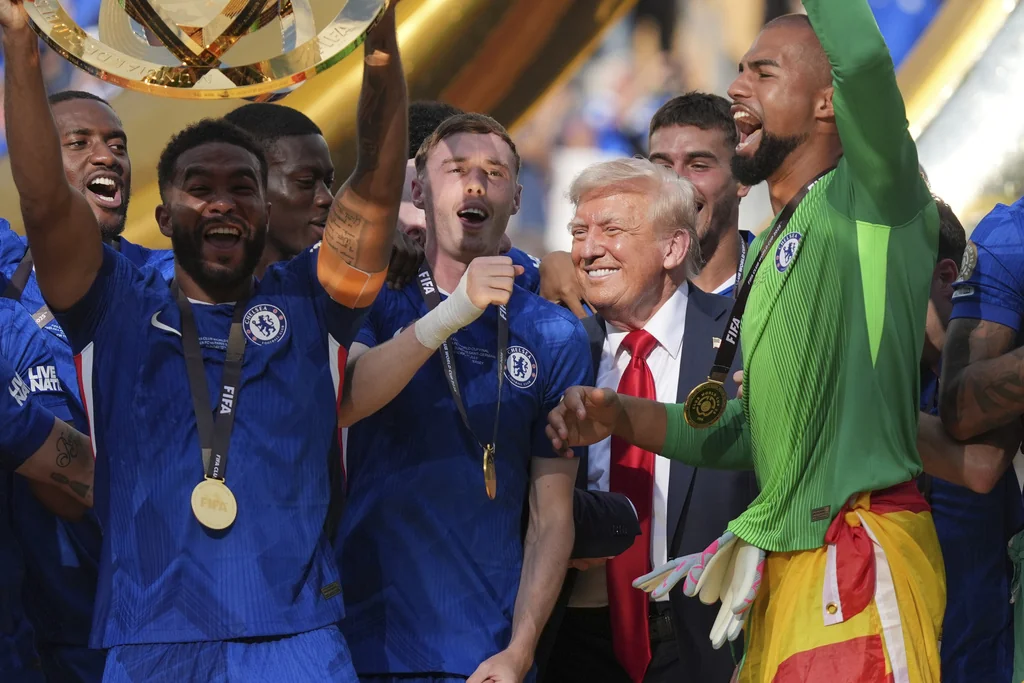
“They told me that [Trump] was going to present the trophy and then exit the stage,” James told the Athletic after the match. “I thought he was going to exit the stage, but he wanted to stay.”
Miguel Delaney, chief soccer correspondent for Britain’s Independent newspaper, said the world was watching “the full Trumpification of Infantino and FIFA,” the takeover of a sport increasingly shaped by the agendas of powerful corporate sponsors and sovereign wealth funds with close ties to Trump.
“There’s this brazenness to everything, as old norms and standards are cast aside,” Delaney said, emphasizing the strangeness of Trump’s onstage presence. “Trump doesn’t even get to stand in the center of the Super Bowl presentation.”
Despite concerns that the tournament has become a political power fest, there are signs it won’t matter much to fans.
Dave Guenther, president and founder of Roadtrips, one of North America’s leading sports experience companies, told the Washington Examiner that he’s seen an increase in interest.
“Soccer fandom continues to surge across North America, and for many fans, the FIFA World Cup represents the pinnacle of global sport — an event they feel compelled to experience in person,” he said. “We’re seeing strong demand from passionate supporters across the U.S. and around the world, especially from Americans with Latino heritage, for whom the World Cup is consistently our most requested event.”
So far, Roadtrips has contracted more than 60 hotel partnerships across all 16 host cities.
Last dance for Messi and Ronaldo?
Part of the frenzy could be attributed to seeing two of soccer’s all-time greats possibly face off one last time.
When Argentina’s Lionel Messi led his team to World Cup victory three years ago in Qatar, the tournament was pitched as the last act between the soccer legend and his longtime rival, Cristiano Ronaldo of Portugal. However, Ronaldo, 40, and Messi, 38, who plies his trade these days in the U.S. for MLS team Inter Miami, are both still playing for their country and may return for one last tournament.
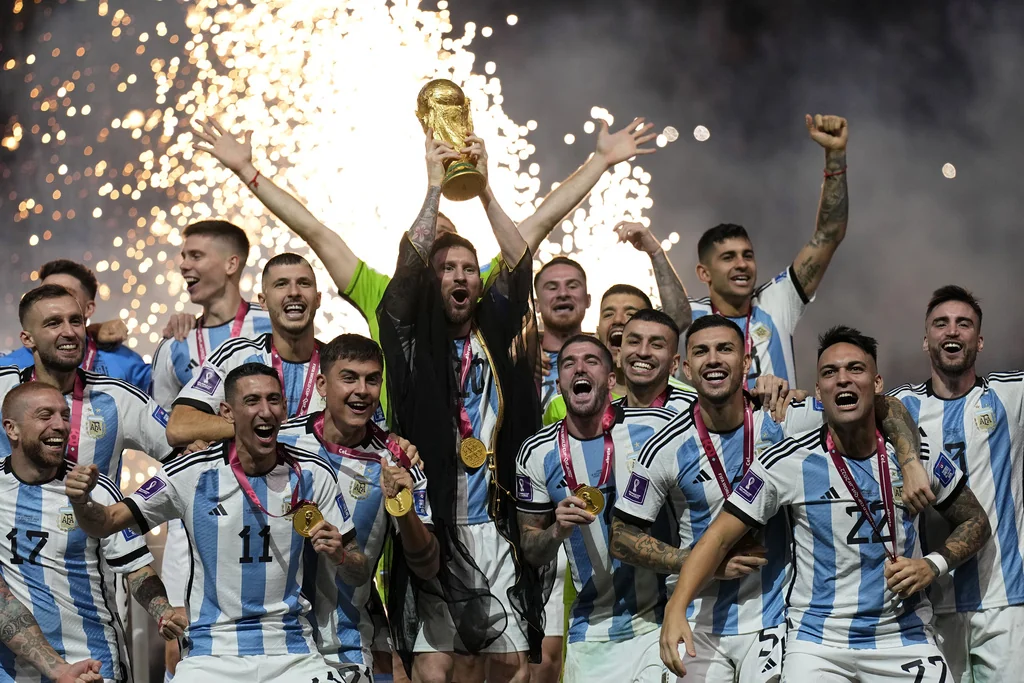
Organizers hope they do.
In Messi’s case in particular, his move to the MLS has resulted in a huge boost in popularity for the game in the U.S. market, and polling has him as the most popular athlete in the country, joining rarefied air shared by the likes of Michael Jordan and Tom Brady.
The “Messi effect” on the U.S. soccer market includes a surge in ticket sales, overall league popularity, increased viewership, and merchandise revenue. His impact also extends beyond the field and affects local businesses and even real estate values in south Florida.
“We’d been tracking his rise as favorite athlete for the past decade, but the combination of a World Cup win and the move to the U.S. helped push him to the top for the first time,” according to SSRS Research.
TRUMP WAVES TO FANS AS HE TAKES IN FIFA CLUB WORLD CUP FINAL
Messi has separated himself from Ronaldo following Argentina’s World Cup win in 2022 and again after he moved to Miami. Despite Ronaldo’s early exit in the last World Cup and his deal with a Saudi soccer team that limited his exposure in the U.S., he remains incredibly influential.
International fans, alongside American ones, will shell out big bucks to watch both men play, which could go a long way in shaping soccer’s presence in the country for years to come.



